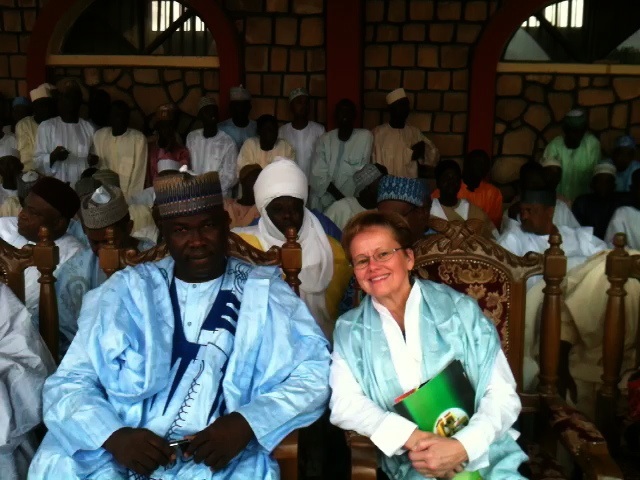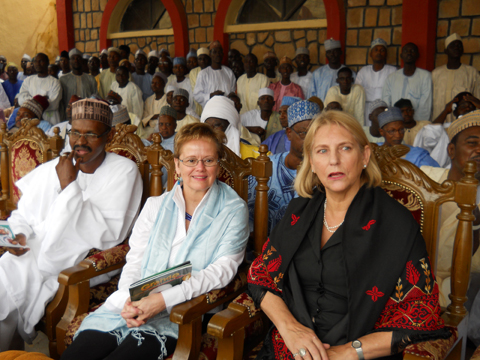
I wish every American could have sat in my seat this morning, celebrating the holy celebration of Eid-El-Fitr Sallah, rather than waiting to see if the Florida pastor would burn copies of the Quran. Today, Muslims around the world are celebrating the end of Ramadan, a sacred time of fasting, prayer and contemplation. Today, I had the privilege of sitting in the front row with Muslim leaders from around the state of Adamawa in Nigeria as they honored their traditional leader, the Lamido (leader in Fulani) as well as the local governor.
A stunning procession of decorated horses, male and female dancers, musicians playing traditional horns and beating drums, all in beautiful, traditional costumes, paraded in front of their leaders, thanking and honoring them for their leadership. It reminded me of several of our celebrations in America -- the Rose parade and a 4th of July celebration wrapped in one ceremony. Many Americans though would find it incomprehensible to compare a Muslim ceremony with a traditional 4th of July parade.
Why are so many Americans unwilling to try to understand and respect a religion and culture embraced by one out of every five people in the world? Think of the terms we hear most frequently and images that we see on television and the Internet referring to Muslims: "Islamic militants, Islamic terrorists, Jihadists and. Islamofascism." The Muslim world is not monolithic in its politics, culture, or approach to religion. It stretches from the secular states of Indonesia, Turkey and Senegal to countries where Islam is supported by the state such as Morocco, Egypt, Jordan, Bangladesh and the United Arab Emirates to countries where Islam is the basis for political institutions in places like Saudi Arabia, Iran and Pakistan. While we usually associate Islam with the Middle East and Arab countries, less than 15% of Muslims are Arab. According to the Pew Forum on Religion, the largest Muslim populations are in Indonesia and Pakistan followed by India, Bangladesh, Egypt, Nigeria, Iran and Turkey. Muslims speak more than 60 languages, come from many diverse ethnic backgrounds and are the majority in 57 countries. Why do we know so little about this important religion, and have allowed misunderstandings and distortions to dominate the public discourse? Rather than responding to Muslims with hate and hostility we need to find ways to understand, respect and be pragmatically engaged with the Muslim world.
One of the reasons I took the position as president of the American University of Nigeria (AUN) is to learn more about Islam. Currently, I am living in the most religiously conservative state in all of Nigeria, (the most populous country in Africa and currently the eight largest country in the world.) Called Adamawa State, it is where AUN is located. The city of Yola, home of AUN, is a remarkable place where Muslims and Christians each comprise about half of the population, and the university's makeup reflects these same approximately equal proportions. There is no history of religious animosity in this state -- it is considered a model for the nation and certainly could be for the world. As the new president of the university, last week I congratulated Muslims as they ended their Ramadan period and found a new location for the growing number of Christians to hold their Sunday services. Students have asked if we could build both a chapel for the Christians and a mosque on the campus. The students give me hope that we can find common ground between the great religions of Christianity and Islam -- they live together, study together, worship next to each other, and deeply respect and understand their fellow students' religious choices and beliefs.
The Lamido, who holds both a law degree and PhD, ended today's ceremony with inspiring words that could have been voiced by any religious leader around the world: "May we all live in peace and harmony with each other. May we respect each other. We are thankful for the blessings of the rainy season which means we will have a good harvest."
Amen.
